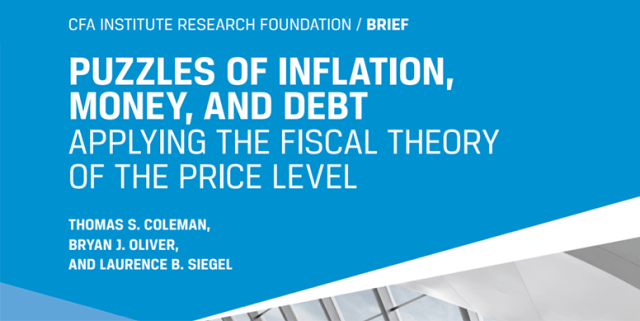[ad_1]
“This is a time of testing — a testing not only of our capacity collectively to reach coherent and intelligent policies, but to stick with them.” — Paul Volcker, 9 October 1979
Paul Volcker and his colleagues on the Federal Open Market Committee (FOMC) deserve praise for sticking to their campaign to tighten monetary policy despite the painful recession of 1981 to 1982. Their actions ended the brutal stagflation that tormented the nation in the latter stages of the Great Inflation of 1965 to 1982. Forty years later, it is easy to forget that Volcker’s programs were much harder to defend when he was, in monetary policy terms, blazing a trail through virgin forest.
The United States has suffered devastating depressions and financial panics in the course of its history, but there has only been one Great Inflation. Resolving this extraordinary crisis required the US Federal Reserve to enact untested policies that all but assured a deep recession, a sharp decline in asset values, and a painful spike in unemployment.
Volcker spoke to the American Bankers Association (ABA) on 9 October 1979 to win their support for these policies, knowing that his prescription would inevitably cause pain and hardship in the short term. He appealed to his audience’s sense of collective responsibility, acknowledging the extraordinary weight placed on their shoulders. After all, bankers, financiers, and investment professionals are stewards of the nation’s credit, which was repaired by Alexander Hamilton in 1790. The ability to maintain that creditworthiness has fueled the US economy, rescued it from economic crises, and protected the nation from foreign threats.
The persistent inflation that Volcker was trying to eliminate had damaged the nation’s economic health. Why was inflation so tenacious in the 1970s? One of the most important reasons was a collective failure of policymakers to delay gratification. Unwilling to sacrifice his Great Society programs, scale back the conflict in Vietnam, or damage his own reelection prospects, President Lyndon Johnson insisted the Fed maintain an overly accommodative monetary policy. President Richard Nixon pursued a similarly self-interested course, and inflation took hold and became endemic. Rather than assert the Fed’s independence, Fed chairs William McChesney Martin, Jr., and Arthur F. Burns succumbed to the political pressure.
By letting inflation fester for so long, they made it that much more difficult for their successors to tame. Far more economic pain was required to fix the problem than if the Fed had decisively intervened earlier.
Volcker recognized the damage that the Fed’s wavering resolve had caused, but he vowed to persevere.
“Some would suggest that we, as a nation, lack the discipline to cope with inflation,” he told the ABA. “I simply do not accept that view.”

On 13 September 2022, the US Bureau of Labor Statistics reported that the CPI increased at an annualized rate of 8.3%, placing more pressure on the Fed to respond aggressively. When Jerome Powell says that the Fed will keep tightening until the job is done, I strongly believe that he is sincere. But it remains to be seen whether the Fed’s actions will match these words over the coming months. The first series of rate increases and quantitative tightening were relatively painless. The next phase won’t be. If the Fed follows through, the economy will contract, unemployment will rise, and markets will fall. All of this pain is necessary to ensure that the current temporary inflationary event does not morph into a replay of the Great Inflation, which would threaten our long-term prosperity.
During the Panic of 1907, J. Pierpont Morgan realized that the failure of the Trust Company of America would be a fatal tipping point that could plunge the country off the economic precipice. Morgan famously stated, “This is where the trouble stops,” and proceeded to orchestrate a rescue. Even after stopping the run at the Trust Company of America, panic continued to spread on Wall Street. Morgan spent the next three weeks rallying the support of trust companies, national banks, private corporations, politicians, and other stakeholders. Together, they pooled their resources and steered the United States away from the edge of the abyss. His timely leadership — combined with politicians’ terror at the prospect of confronting a future panic without J. Pierpont Morgan — inspired the creation of the Fed six years later.
The Fed leadership now faces a similar tipping point. They will need to decide whether they have the resolve to prevent a second Great Inflation. But countering inflation is not the Fed’s responsibility alone to bear: The moment that is now upon us will require everybody to decide whether we will cling to the excessive but unsustainable spoils of the present or sacrifice now in order to build a richer legacy for future generations.
I hope we choose the latter.
If you liked this post, don’t forget to subscribe to the Enterprising Investor.
All posts are the opinion of the author. As such, they should not be construed as investment advice, nor do the opinions expressed necessarily reflect the views of CFA Institute or the author’s employer.
Image courtesy of the Edmond J. Safra Center for Ethics. This file is licensed under the Creative Commons Attribution 2.0 Generic license. Cropped.
Professional Learning for CFA Institute Members
CFA Institute members are empowered to self-determine and self-report professional learning (PL) credits earned, including content on Enterprising Investor. Members can record credits easily using their online PL tracker.
[ad_2]
Source link



